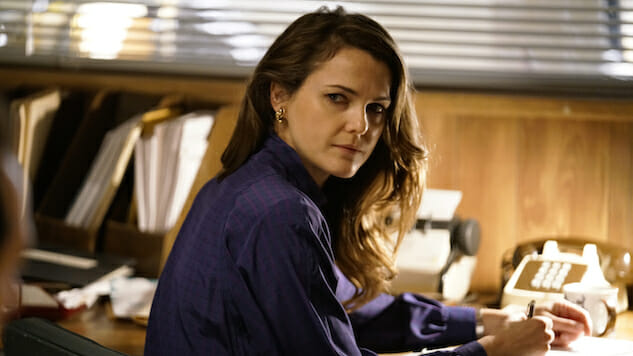The Americans‘ Patience Pays Off in the Brilliant, Surprising “Darkroom”
(Episode 5.10)
Patrick Harbron/FX
There are, by my count, three dark rooms in “Darkroom,” all nestled within the hour’s outstanding second half: The one described by the EST seminar leader, spliced to superb effect with Philip’s (Matthew Rhys) daylight run; the one in which he and Elizabeth (Keri Russell) are married by a Russian Orthodox priest (Konstantin Lavysh); and the one in which the Jennings examine, in tandem, Pastor Tim’s (Kelly AuCoin) fretful assessment of Paige (Holly Taylor). As with the finest entries in The Americans’ canon, then, including “Behind the Red Door,” “Do Mail Robots Dream of Electric Sheep?” and “The Magic of David Copperfield V: The Statue of Liberty Disappears,” “Darkroom” pieces together otherwise disparate fragments through its elaboration of a single theme, though I must admit I was wrong, in my review of “IHOP,” to predict its form as “fission.” No, in the exchange of rings as in that blood-red light, or in the match cut of Philip’s face as he hears he’s a pre-programmed machine, The Americans achieves a far more powerful force: fusion.
To unite the characters in common purpose, “Darkroom” must first establish their divisions, and it does so in subtle, efficient strokes. Philip and Elizabeth’s aliases often contain the germ of their private lives, so it’s telling that their respective conversations with Alexei and Evgheniya Morozov (Alexander Sokovikov and Irina Dvorovenko) should refer to the complications of kinship: Philip’s suggestion that there is no permanent peace in marriage (“She’s my wife, I’m going to fight with her, right?”) echoes Elizabeth’s advice for her adulterous mark (“Then fight for that”), underscoring the intractable disagreements that shadowed the action last week. It’s their conversation in the office, though, after Paige describes the contents of Pastor Tim’s diary, that most succinctly expresses the distance between them; combining changes of focus, tight close-ups and a scant handful of cuts, the moment finds the couple of two minds—Philip’s concerned that Paige’s upset is likely to linger, while Elizabeth’s confident Paige will be fine.
Unlike the Burovs, suffering through dinner together in silence, or the Morozovs, already damaged—perhaps beyond repair—by their life in exile, events soon conspire to drive Philip and Elizabeth together. It may be that Pasha’s struggle at school stirs up thoughts of Paige, made miserable by Pastor Tim’s scribbling, revealing the Jennings’ secret: As with Kimmy, Young Hee, and especially Martha, the plan to break Pasha, orchestrated by Tuan (Ivan Mok) with Philip and Elizabeth’s assent, presses on the omnipresent bruise beneath The Americans’ surface, its understanding that no one is immune to the pain of isolation, the awful twinge of broken trust. (“I don’t want Stan to be like Martha,” Philip says, in a similar vein, when Elizabeth questions his ongoing suspicion of Renee.) Even likelier, it’s that their strained exchange with Claudia (Margo Martindale) pushes the pair to set aside their differences in favor of that familiar alliance; the way Claudia brushes off their request for news of the hemorrhagic fever, then condemns them to “years” in the arms of Stobert and Kemp, sends Philip and Elizabeth off in disgust, seething at the Centre’s incomprehensible workings.
-

-

-

-

-

-

-

-

-

-

-

-

-

-

-

-

-

-

-

-

-

-

-

-

-

-

-

-

-

-

-

-

-

-

-

-

-

-

-

-








































